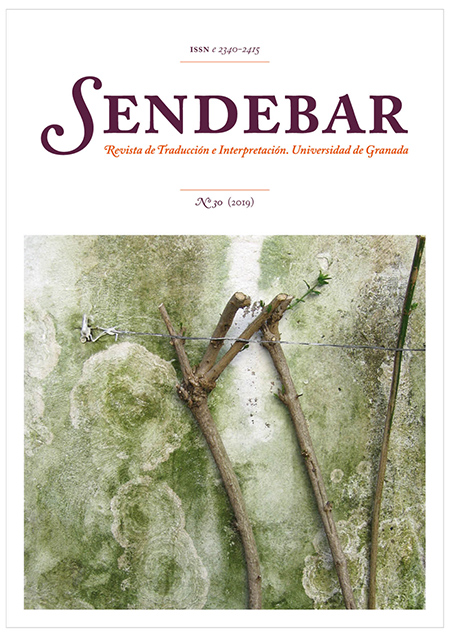La tendencia domesticante de la traducción china del cuento La viuda Ching, pirata, de Jorge Luis Borges
DOI:
https://doi.org/10.30827/sendebar.v30i0.8543Palabras clave:
domesticación, traducción literaria español-chino, Jorge Luis Borges, La viuda Ching, pirataResumen
El artículo pretende revisar la traducción china del cuento «La viuda Ching, pirata» de Jorge Luis Borges, centrándonos en la tendencia domesticante existente en el texto meta. Para ello, llevaremos a cabo un análisis de la fuente de la historia, la presencia del conflicto de la injerencia cultural y de la retrotraducción. Mediante los ejemplos seleccionados, analizaremos las soluciones que propone el traductor, los motivos de la selección del método traductor, las variaciones con respecto al texto original y los errores de traducción, con el objetivo de sacar conclusiones de que el traductor ha intensificado el color de la cultura meta y en cierto modo, ha modificado el valor estético del cuento de Borges.
Descargas
Citas
Beijing waiguoyu xueyuan xibanyayuxi xinxihancidian zubian 北京外国语学院西班牙语系《新西汉词典》组编 (1982). 《新西汉词典》 [Nuevo diccionario español-chino]. Beijing: Shangwu yinshuguan.
Borges, Jorge Luis (1974). Obras Completas (Vol. I). Buenos Aires: Emecé Editores.
Borges, Jorge Luis (2015). 《恶棍列传》 [Historia universal de la infamia]. (Wang Yongnian王永年, trad.). Shanghai: Shanghai yiwen chubanshe.
Cai, Yazhi (2016). Estudio contrastivo y traductológico del eufemismo en chino y español a partir de tres novelas clásicas de las dinastías Ming (1368-1644 d.C.) y Qing (1636-1912 d.C.). Tesis doctoral. Granada: Universidad de Granada.
Casas Tost, Helena y Rovira-Esteva, Sara (2008). Un análisis traductológico e intercultural de la literatura popular china: el caso de las «escritoras guapas». Trans 12, 211-230.
Casas Tost, Helena y Rovira-Esteva, Sara y Niu Ning (2014). La extranjerización como método traductor: coincidencias y divergencias entre Lu Xun y Venuti. Trans 18, 183-197.
Chen, Fukang 陈福康 (1992). 《中国译学理论史稿》 [A History of Translation Theory in China]. Shanghai: Shanghai Waiyu Jiaoyu Chubanshe.
Gao, Yuan (2014). 西班牙语委婉语的多元翻译 [La traducción de eufemismos del español al chino—una perspectiva multifacética]. Tesis doctoral. Beijing: Universidad de Estudios Extranjeros de Beijing.
Gosse, Philip (1934). The History of Piracy. New York: Tudor Publishing Company.
Guibert, Rita (1976). Borges habla de Borges. En Jorge Luis Borges. Jaime Alazraki (ed.), 318-355. Madrid: Taurus.
Lin, Chi-lien (2011). Estudio estilístico contrastivo de las seis traducciones al chino de Platero y yo. Tesis doctoral. Barcelona: Universidad Autónoma de Barcelona.
Molina, Lucía (2006). El otoño del pingüino : análisis descriptivo de la traducción de los culturemas. Castelló de la Plana: Universitat Jaume I.
Ramírez Bellerín, Laureano (1999). Del carácter al contexto: teoría y práctica de la traducción del chino moderno. Bellaterra: Universitat Autònoma de Barcelona.
Rovira-Esteva, Sara (2014). La representación del otro chino a través de la traducción de los referentes culturales. En Estudios de traducción e interpretación chino-español. Gabriel García-Noblejas Sánchez-Cendal (ed.), 131-163. Granada: Universidad de Granada.
Schleiermacher, Friedrich (2000). Sobre los diferentes métodos de traducir. (Valentín García Yebra, trad.). Madrid: Gredos.
Venuti, Lawrence (1995). The Translator’s Invisibility. A history of translation. Londres: Routledge.
Wang, Yufeng 王玉峰 (2012). 四字成语连用译句的可读性与有效性 [La legibilidad y la validad del uso seguido del chengyu de cuatro caracteres]. 外语研究 [Foreign Languages Research] 4, 84-87.
Yuan, Yonglun (1831). History of the Pirates who Infested the China Sea from 1807-1810. (Karl Friedrich Neumann, trad.). London: Printed for the Oriental Translation Fund.
Xiao, Guojian萧国健 y Bu, Yongjian卜永坚 (eds.) (2007). 《靖海氛记》原文标点及笺注 [El texto original y notas de Jing Hai Fen Ji]. 田野与文献 [Fieldwork and Documents: South China Research Resource Station Newsletter] 46, 6-29.
Descargas
Publicado
Cómo citar
Número
Sección
Licencia
Terminos de Licencia Sendebar.

















